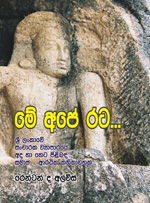Tourism is an industry with perhaps the highest potential for Sri Lanka. It is yet considered an upmarket affair relevant only to a handful of elite in the business community. Renton de Alwis, one of the most respected tourism experts in this part of the world, has made a bold attempt to create a public dialogue on the subject of tourism by authoring a book on the subject in Sinhala titled 'Me ape rata'- a socio economic dialogue on the present and future of the tourism industry in Sri Lanka". This collection of 15 short chapters written in very simple Sinhala is in my mind, a 'must read' by anyone who is interested in tourism and the overall development of the country.
Tourism is an industry that has links and impacts across the whole spectrum of society. If tourism is to be successful it must be recognized as a vital economic activity and the whole nation must be partners of the national tourism strategy.
The type of tourism we do will be the collective responsibility of all of us.
In order to reach this national consensus there must be a wide and informed discussion on the subject and it is in that context that Renton's book must be appreciated.
The first feature one notices in this book is its language. By making it simple and readable, he ventures to involve the reader in a discussion of the subject.
In his foreword Renton draws our attention to the point that tourism is a devolved subject subsequent to the 13th amendment, thereby creating the need to have a different skill set and attitudes towards the subject to get the maximum benefit tourism brings to the nation.
The chapter headings themselves need to be appreciated since they are provocative and more like advertising headlines that invites the reader to explore and engage.
In the first chapter he captures the history of our tourism industry recognizing contributions made by different personalities. The brief but comprehensive history is useful to contextualise the different aspects of the tourism industry.
In his writings, Renton argues that if the country is to benefit from tourism it should be an industry that brings benefits to the wider population of the country not only as employees but as direct owner stakeholders. He makes an effort to position the tourist as a human being who wants to experience Sri Lanka rather than an "economic subject" that brings dollars to the country.
This approach itself will condition the business model and calls for a change of the attitudes that are prevalent at present. He analyses the profile of current tourist or the visitor to Sri Lanka who is not only Caucasian, hence the common approach "sudda"- the white man is not relevant any more. He points out that our attitude towards visitors to Sri Lanka should be as guests leveraging the natural hospitality of our nation.
One other strong argument he presents is the need to consider the quality of the visitor rather than the quantity. In this context he points out the new opportunities that are available today to engage in more niche marketing efforts offering a unique mix of attractions that Sri Lanka offers going beyond being an island with beaches.
If one wants to generate new ideas as to what the available tourism options are, this book is an ideal catalogue. In presenting these ideas, Renton uses his years of experience gained by being actively engaged in the tourism industry in many countries that are similar to ours and his exposure across the globe.
The importance of developing local tourism in order to provide a quality experience to the foreign visitor is another idea that needs attention of all.
Renton develops a very important thought focusing on the disabled. If we can make Sri Lanka a place that is disabled-friendly, it can be a unique advantage in tourism. With an ageing population and a large number of physically disabled persons entering mainstream society, following three decades of war, this idea alone is worthy of national recognition.
Under the heading 'Ayubowan' or 'Good Morning', Renton generates a valuable discussion on the type of tourism we must develop. While emphasising the importance of mastering foreign languages Renton makes it very clear that languages are only tools. Addressing the value that is attached to English as a social differentiator, he compares English to a 'Hiramanaya' (coconut scraper) and says "use it, not worship it". He also draws examples from countries such as Indonesia, Malaysia and Nepal as to how they have leveraged the local languages and cultures to give a unique experience to the visitor.
He offers an authentic definition and a base for a tourism policy framework using the popular folk poem:
"Onna male oya na mala nela waren
Atta bindei paya burulen taba waren
Kelani Gange oru yanwa bala waren
Sadukara dee oruwaka negi waren
Giving it a unique interpretation of "Friend, colleague let us explore the wonderful resources around us, but do it with care and adopt conservatory ways, let us plan ahead our strategy using sound ideas and ensure that we incorporate our ethos and what and who we are to our offer to our visitors".
He says this gives the structure to a sustainable tourism policy framework that protects the culture, nature and all that is linked with them that can be part and parcel of the tourism industry.
At the end of the book he has added a list of websites that can be used by those small and medium entrepreneurs who want to find information and develop productive relationships in the field of tourism. |

